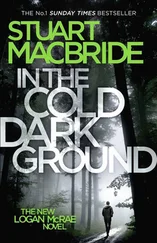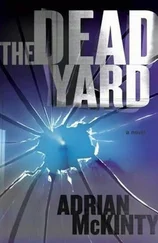Adrian McKinty - The Cold Cold Ground
Здесь есть возможность читать онлайн «Adrian McKinty - The Cold Cold Ground» весь текст электронной книги совершенно бесплатно (целиком полную версию без сокращений). В некоторых случаях можно слушать аудио, скачать через торрент в формате fb2 и присутствует краткое содержание. Жанр: Триллер, на английском языке. Описание произведения, (предисловие) а так же отзывы посетителей доступны на портале библиотеки ЛибКат.
- Название:The Cold Cold Ground
- Автор:
- Жанр:
- Год:неизвестен
- ISBN:нет данных
- Рейтинг книги:5 / 5. Голосов: 1
-
Избранное:Добавить в избранное
- Отзывы:
-
Ваша оценка:
- 100
- 1
- 2
- 3
- 4
- 5
The Cold Cold Ground: краткое содержание, описание и аннотация
Предлагаем к чтению аннотацию, описание, краткое содержание или предисловие (зависит от того, что написал сам автор книги «The Cold Cold Ground»). Если вы не нашли необходимую информацию о книге — напишите в комментариях, мы постараемся отыскать её.
The Cold Cold Ground — читать онлайн бесплатно полную книгу (весь текст) целиком
Ниже представлен текст книги, разбитый по страницам. Система сохранения места последней прочитанной страницы, позволяет с удобством читать онлайн бесплатно книгу «The Cold Cold Ground», без необходимости каждый раз заново искать на чём Вы остановились. Поставьте закладку, и сможете в любой момент перейти на страницу, на которой закончили чтение.
Интервал:
Закладка:
Lee McCrea was a BBC presenter on the late-night local news. Dougal Campbell was a talkshow host on Radio Ulster. Gordon Billingham, a sports reporter on UTV. Scott McAvenny ran Scott’s Place, the only decent restaurant in Belfast. Of course they were all gay men, not out as such, but well known.
“What’s the verdict, gentlemen?” I asked.
“He’s a nutter!” Matty said.
“A nutter who can type without making a single mistake,” I said.
Brennan looked at me. “That’s good, Sean, what else jumps out at you?”
“It’s not a very comprehensive list, is it? Four pretty obvious homosexuals.”
“Aye, plus the two he’s already topped,” McCallister added.
“I suppose we better have that press conference on Monday morning,” Brennan said.
“And we better give those boys protection,” I suggested.
“I’ll call Special Branch,” Brennan said wearily.
I reread the note and sat down. I had a splitting headache. I had been hit by a dozen stones and half bricks, one right off the top of my riot helmet.
I looked out the window at the lights of ships moving down the black lough into Belfast’s deep water channel.
Brennan was talking to me but I didn’t hear him.
I watched as the pilot boat put out from under the castle to bring a cargo vessel into Carrick’s much smaller and trickier harbour.
“ … go on home,” Brennan finished.
“What?”
“I said you look like Elvis at his 1977 CBS special, why don’t you go on home?”
“I’ve things to do.”
“Just go. Have a drink, have a bath. Might be the last one you take for a while, I heard the power-station workers are going on strike.
“I can’t. I’m still waiting for the prints on John Doe.”
“I’ll wait. You go on. That’s an order, Sean.”
“Yes, sir.”
I decided to walk home. A mistake. A downpour caught me on Victoria Road. Heavy, cold rain from a long looping depression over Iceland.
Coronation Road.
The quintessential Irish smell of peat smoke rising up to meet the rain.
Light and fear and existential depression leaking through the net curtains.
#113.
I turned the key and went inside. I had forgotten about the phone tap and was surprised to see a black box next to my telephone. Kernoghan’s boys hadn’t left any trace apart from that. I stripped off my clothes, went into the kitchen and opened the empty fridge. Half a can of Heinz beans. Some yellow cheese. I ate beans and toast and lit the upstairs paraffin heater and went to bed.
I found myself dreaming of the girl hanging in the forest.
It was dusk and the stars were coming out over western Scotland and eastern Ireland and the sunken realm between the two. I’ve never liked the woods. My grandmother told me that the forest was an opening to someplace else. Where things lurked, things we could only half see. Older beings. Shees . Shades of creatures that once walked the natural world, redundant now, awaiting tasks, awaiting their work in dreams.
“ Le do thoil ,” I said to them in Irish, but they wouldn’t listen, calling my name from behind oaks and fairy trees, mocking me, teasing me until 3 a.m. when I awoke to the sound of sirens.
7: SATURDAY NIGHT AND SUNDAY MORNING
I found that I wasn’t in bed. I was sleeping on the landing in front of the paraffin heater. This was becoming my foetal space. I was wearing a Thin Lizzy T-shirt and grey sweat pants. I had no memory of putting them on.
I went downstairs and opened the front door.
The whole street was out.
I walked to the end of the garden path. Number 79 was on fire. The Clawsons’ house. I joined the gawkers because who can resist a fire? A wee milly in a dirty frock filled me in on the details. “Chip pan fire. Whole kitchen went up.”
With gas cookers and chip pans in every kitchen, the chip-pan fire was by far the most popular method these Proddies had for burning their houses down. The second technique was the ever popular chimney fire and number three had to be the drunken cigarette drop on the carpet. Mind you, why they’d be cooking chips at this hour was anyone’s guess.
The crowd grew and I saw people that I vaguely recognized from as far away as the Barn Road. The kitchen burned and despite the best efforts of the brigade it spread to the rest of the house.
Mrs Clawson screamed about her fish tank and when a second fire tender equipped with foam arrived one of the firemen went in and rescued the fish.
When the blaze was finally contained the crowd erupted into spontaneous applause and tea and biscuits were pressed into the hands of the crew — which had to be nicer than getting bricked in the Catholic estates. They kept pumping in foam and it began to fill the street, taking to the air in huge tufts, blowing this way and that.
We were in the snow again.
Mrs Clawson was wailing now, standing there, half tore, in her dressing gown with no knickers.
The kids were playing in the artificial snow and the firemen were flirting with the single women and some of the lonely married women whose husbands were over the water.
I yawned and checked my watch.
3.20. Time to head back. I began to walk in that direction.
Someone grabbed my shirt from behind.
I turned. Big guy, 6’9” with a gut, a Zapata moustache, a white wifebeater T-shirt and blue jeans. He was fifty or thereabouts and on his head was what could only be a wig although you’d have had a tough job getting up there to check it out.
“Where’s your fancy car now, fenian?” he said.
I ignored him and kept on walking.
He pushed me and I stumbled but recovered my balance in time to see a haymaker coming at me.
Mrs Bridewell and Mrs Campbell both screamed.
“Look out, Mr Duffy!” Mrs Campbell yelled, her hand at her throat.
Several people turned to look. The haymaker made its painfully slow arc across the air between us. It missed me by nine inches without me having to do anything.
“What’s your problem, pal?” I asked.
“What about those people at the Peacock Room, you fucking fenian bastard, what chance did you give them, ya taig piece of shit!” the big ganch said and swung another punch which also missed.
Neither talking nor fighting were his strong points.
“Go home, mate,” I told him.
“I’m not your mate. Your fenian pals killed those people for nothing! I hope you all go on hunger strike. I hope you all starve to death! We should have starved you out in the bloody famine!”
Whoever he was, he was cross and the worse for drink and there was no point arguing or getting into a fight with a drunk.
He reached into his pocket and started fumbling with something.
“Oh my God, he’s got a knife! Oh, Mr Duffy, watch him!” Mrs Campbell called out.
It was a standard flick knife with a button on the handle but he was so pissed he was having difficulty getting the blade to deploy. “If you’ll allow me,” I said, snatching the knife out of his hands and pushing the button.
“See?” I said as I put the blade in and gave him the knife back. That, I realized later, was my mistake. I had humiliated him.
He was a friend visiting Bobby Cameron and Bobby now felt it was his duty to intervene.
Bobby lived six doors down from me on the same terrace. We’d never spoken, but of course I knew who he was. Medium height, plump, ginger bap, twenty-eight. His wife cut your hair for two pounds in her back kitchen. He was on long-term unemployment benefit but he was also a divisional officer of the Ulster Freedom Fighters, a faction of the UDA, and one of the nastier Protestant terrorist groups; he was a man who, in theory, could have you killed at the drop of a hat, but in practice wouldn’t because killing a cop — even a Catholic cop — would mean a feud with every other loyalist faction in Carrick. A feud would be bad news in strategic terms but, of course, few of the loyalists ever thought strategically. (The IRA had a graffito somewhere in Belfast that I always got a kick out of: “The IRA think, while the UDA drink.”)
Читать дальшеИнтервал:
Закладка:
Похожие книги на «The Cold Cold Ground»
Представляем Вашему вниманию похожие книги на «The Cold Cold Ground» списком для выбора. Мы отобрали схожую по названию и смыслу литературу в надежде предоставить читателям больше вариантов отыскать новые, интересные, ещё непрочитанные произведения.
Обсуждение, отзывы о книге «The Cold Cold Ground» и просто собственные мнения читателей. Оставьте ваши комментарии, напишите, что Вы думаете о произведении, его смысле или главных героях. Укажите что конкретно понравилось, а что нет, и почему Вы так считаете.











